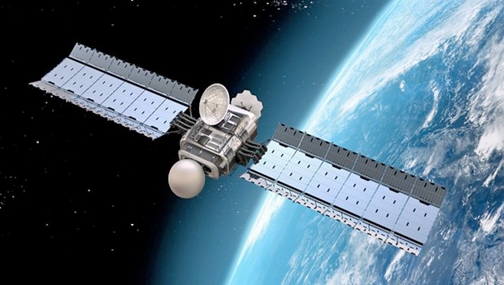

The Indian Space Research Organization (ISRO) has selected Arianespace to launch their GSAT-11 telecommunications satellite.

Artistic rendition of the ISRO's GSAT-11 satellite.
The satellite will be launched by an Ariane 5 launch vehicle from the Guiana Space Center, Europe’s Spaceport in Kourou, French Guiana, in 2017. The GSAT-11 satellite, designed, assembled and integrated by ISRO, will weigh about 5,725 kg at launch. GSAT-11 is an advanced communication satellite with multi spot beam coverage over the Indian mainland and nearby Islands to bring a huge advantage to the user community, as compared with the existing INSAT/GSAT satellite systems. With this new system architecture and the cutting-edge technology elements proposed to be employed for realization, GSAT-11 will generate a capacity of more than 12 Gbps for users from a single platform.

Additionally, Arianespace is participating in the World Satellite Business Week (WSBW) conference in Paris organized by Euroconsult from September 12 to 16. Building on a sustained operational pace, new performance records and eight contracts already signed in 2016, Arianespace is the benchmark for space transportation.
Stéphane Israël, Chairman and Chief Executive Officer of Arianespace, will participate in the roundtable discussion, "Toward a renewed commercial access to space," on Tuesday, September 13, at 4:15 p.m.
Arianespace's Ariane 5 launcher set a new performance record in August 2016 as it boosted 10,735 kg into geostationary transfer orbit (GTO), marking an increase of 1,400 kg in payload capacity since the start of the Ariane 5 ECA program. Ariane 5 also celebrated its 73rd successful launch in a row in August.
Arianespace has already carried out six launches out of the 11 slated for 2016: four by Ariane 5 and two by Soyuz, sending a total of 37 metric tons net-weight into orbit, including 33 metric tons to GTO. This impressive total puts Arianespace well ahead of all its competitors.
Arianespace has now carried out more than 250 launches from the Guiana Space Center, Europe's Spaceport in Kourou, French Guiana since its inception (231 by Ariane, 15 by Soyuz, 6 by Vega). Five more launches are scheduled before the end of the year, two by Vega and three by Ariane 5:
- September 15: Vega launch of the PerúSAT-1 satellite for Airbus Defence and Space, along with four SkySat satellites for Terra Bella, a Google company
- October 4: Ariane 5 launch of Sky Muster II for nbn and GSAT-18 for the Indian Space Agency ISRO (Indian Space Research Organization)
- November 17: launch of the first Ariane 5 ES version intended for the European Union's Galileo program, carrying four Galileo FOC satellites
The satellite market is constantly evolving and Arianespace's broad service offering addresses their customers' emerging requirements. The company also offers multiple launch systems for other applications, including the dynamic small Earth Observation (EO) satellite market, large constellations in LEO for global connectivity, big data, and so on and all-electric satellites.
At World Satellite Business Week, Arianespace is announcing the signature of three new GEO satellite launch contracts for Ariane 5, one with ISRO (Indian Space Research Organization—see above) and two from undisclosed customers. Arianespace has won a total of eight new contracts in 2016.
The six satellites signed in 2016 for Ariane 5:
- COMSAT NG 1 and COMSAT NG 2, on behalf of French defense procurement agency DGA.
- ViaSat-2 for ViaSat.
- GSAT-11 for ISRO (Indian Space Research Organization).
- Two for undisclosed customers.
Two Vega launch contracts signed in 2016:
- Ceres on behalf of the DGA and French space agency CNES.
- ADM-Aeolus, on behalf of ESA.
Arianespace's order book now stands at 5.3 billion euros for a total of 36 customers representing legacy commercial operators, space start up companies and institutional clients—70 percent of the order book is in export markets, 60 percent of customers are outside the Europe-Middle East-Africa (EMEA) zone.
On July 20, 2016, the European Commission's Competition directorate approved the change in Arianespace's shareholding structure, which will make Airbus Safran Launchers the firm's majority shareholder with a 74 percent stake. As part of the new governance of the launch sector that was established by the European Space Agency, this evolution allows Arianespace to offer increasingly competitive launch services. Arianespace will remain the sole interface with clients and will retain a strict neutrality when it comes to satellite manufacturers. In addition to reaffirmed ties with its industrial supply chain shareholders, Arianespace will work closer with AVIO-ELV when operating the VEGA launch vehicle. Arianespace will continue to guarantee autonomous access to space for ESA and other European space agencies. CNES will remain an essential partner to Arianespace.
Arianespace will continue to contribute concrete proposals for the development and use of the Ariane 6 and Vega C. Workshops on these new launch vehicles, the Ariane 6 and the Vega C, have already been held with Arianespace's customers: the first Vega "User's Day" occurred July 7 and 8, 2016 in Rome, with AVIO-ELV jointly hosting the event; the second workshop, "the Ariane 6 Users' Club" took place September 8 and 9 in Paris with Airbus Safran Launchers as co-host. The plan is to begin selling Ariane 6 and Vega C launches by the end of the year.
Finally, Arianespace continues to improve its competitiveness by optimizing the cost of the launch systems and through continuously increasing the performance of the Ariane 5 launch vehicle.
http://www.satellite-business.com/

